
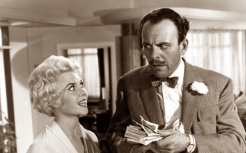
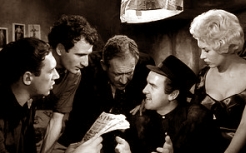
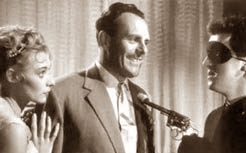

Too Many Crooks (1959)
| Production Company: | The Rank Organisation, Mario Zampi Productions |
| Director: | Mario Zampi |
| Writers: | Christiane Rochefort |
| Jean Nery | |
| Michael Pertwee | |
| Cast: | Anna Neagle (Nurse Edith Cavell) |
| Terry-Thomas (Billy Gordon) | |
| George Cole (Fingers) | |
| Brenda De Banzie (Lucy) | |
| Bernard Bresslaw (Snowdrop) | |
| Sid James (Sid) | |
| Joe Melia (Whisper) | |
| Vera Day (Charmaine) | |
| Delphi Lawrence (Secretary) |
Don’t be surprised if some of this film provokes a sense of deja vu – it was the inspiration for a partial re-make in 1986, the popular Bette Midler/Danny DeVito comedy Ruthless People. Both films are variations of a classic tale, going back at least as far as the old O. Henry story, “The Ransom of Red Chief,” if not further.
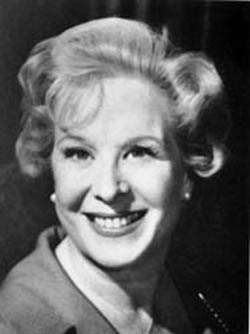
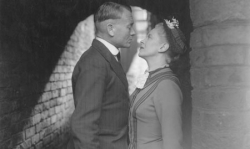
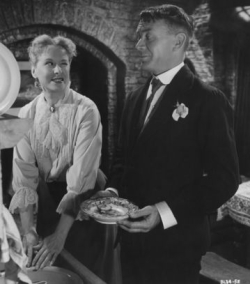
Formidable character actress BRENDA DE BANZIE had a solid stage career before she started making movies in the early 1950s. De Banzie became an unexpected star in middle age, as the result of a wonderful performance in her tenth film, David Lean’s Hobson’s Choice (1954). In that clever domestic comedy, she managed to outshine such stellar actors as Charles Laughton and John Mills, playing the spinster daughter who was the brains (and salvation) of her troubled boot-making family. Many were surprised when her superb performance was ignored by the BAFTA awards (the British equivalent of the Oscars). De Banzie made her first trip to the United States to perform a sinister role in Alfred Hitchcock's remake of The Man Who Knew Too Much (1956). In 1958, she appeared on Broadway in John Osborne’s play The Entertainer, and earned a Tony nomination. She repeated the role, opposite Laurence Olivier, in the successful 1960 film version. Her final film was Blake Edwards’ 1963 hit, The Pink Panther. After that, De Banzie concentrated on television and stage work, playing a range of matronly character roles. She died in 1981, during surgery to remove a non-malignant brain tumour. Her son, Antony Marsh, is also an actor, active primarily on British television.
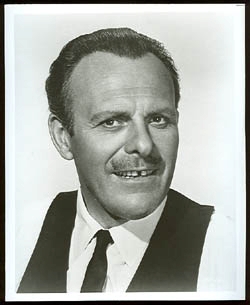
TERRY-THOMAS was a master of silly, malevolent characters – the epitome of the comic cad and bounder. He was not a subtle performer, by any means. Thomas tended to blatantly overact, but audiences found him funny nonetheless. He was always in demand, and worked steadily until illness forced him to quit in the 1970s.
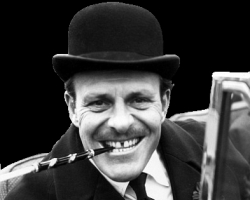
He was born Thomas Terry Hoar Stevens, the son of a well-to-do business executive. As a young man, Thomas soon tired of being a clerk and looked for something more enjoyable. He began working as a film extra and in cabarets. He hit his stride as a performer during World War II. After working under the name “Terry Thomas” for several years, he adopted the hyphen in 1948, “because it felt right.” He often claimed the hyphen represented the notable gap between his teeth. He and his teeth were famous enough to become a medical figure of speech; to this day, British doctors call the widening of the scapholunate space in a traumatic wrist injury a “Terry-Thomas sign.” (In the United States, this is called the “David Letterman sign,” after that other gappy guy.)
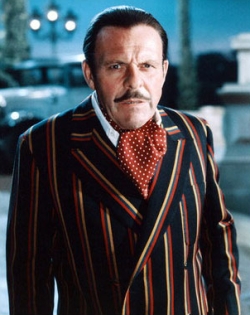
In the mid-1950s, Thomas refined his persona in a popular British television series, How Do You View?, then moved on to films. He helped define the comical cad stereotype, wearing quilted smoking jackets and brandishing a cigarette holder. Audiences howled as Thomas relied on his familiar arsenal of catch-phrases: “What an absolute shower!” – “Good show!” – “You dirty rotter” and the sneering “Hard cheese.”“Hard cheese.”
Thomas was diagnosed with Parkinson's disease in 1971, which led to his retirement. He and co-author Terry Baum worked on his autobiography, Terry-Thomas Tells Tales, published posthumously in 1992. By 1989, Thomas was living in obscurity and in very poor health. With Michael Caine at the helm, British performers organised a benefit concert. Their 5-hour gala raised over £75,000. Terry-Thomas died in 1990, at 78. He left his second wife, Belinda Cunningham, and two sons.
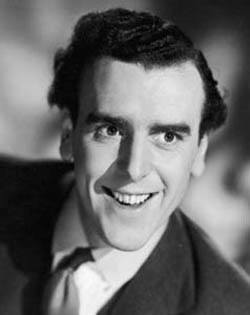
GEORGE COLE was born in 1925, and given up for adoption at the age of ten days. He was adopted by Mr. and Mrs. George Cole of east London. George Jr. grew up with both a strong Cockney accent and a strong desire to perform. He was a promising, talented boy, and he had the very good fortune to be taken in (along with his mother) by Alastair and Naomi Sim during wartime evacuation in 1940. Sim took a keen interest in the boy, becoming his mentor and foster father. He saw that Cole received an education and trained him as an actor.
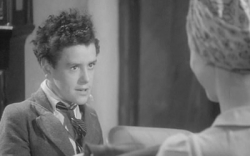
Cole made his film debut at 16 in Cottage to Let (1941), a film starring Sim about child evacuees from London. This was his first appearance in one of Alastair Sim’s movies. They eventually made 11 films together, including Scrooge (1951), in which Cole plays the young Scrooge. Cole’s best-known film role is as dodgy comic criminal “Flash Harry” in the St. Trinian’s movies which starred Sim. Their final film together was The Anatomist (1961).
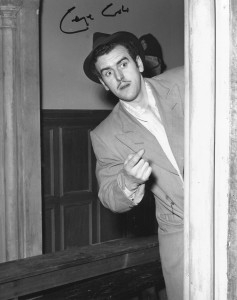
Cole’s career was interrupted by service in the Royal Air Force from 1944 to 1947. He returned to the stage and a great deal of TV work in the 1960s and ‘70s. His portrayal of crooked used car dealer Arthur Daley in the long-running series Minder (1979 to 1994) was so popular that it became a figure of speech in the U.K. – an “Arthur Daley” epitomized the seedy side of Thatcher-era capitalism (much as, across the pond, an “Archie Bunker” became synonymous with bigotry). Cole and his Minder co-star Dennis Waterman recorded a duet, “What Are We Gonna Get ‘Er Indoors?” in 1983 and briefly became pop stars. The two actors reunited in 1988 to voice characters for a children’s TV series, Tube Mice.
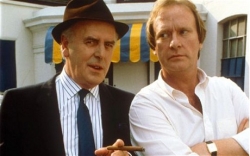
Cole was a lucky boy whose talents enabled him to make the most of his opportunities. He wholeheartedly attributes his career to Alastair Sim. Thanks to Sim’s early training, Cole is able to hide his original London accent with ease, often playing upper class characters. In 1992, Cole was made a member of the Order of the British Empire (OBE) for his services. He remains active on British television, appearing in episodes of New Tricks, Heartbeat and Midsomer Murders. Cole’s career has lasted over 70 years. That’s an impressive record in any profession, and an amazing one in a chancy business like acting.
Notes by Paddy Benham